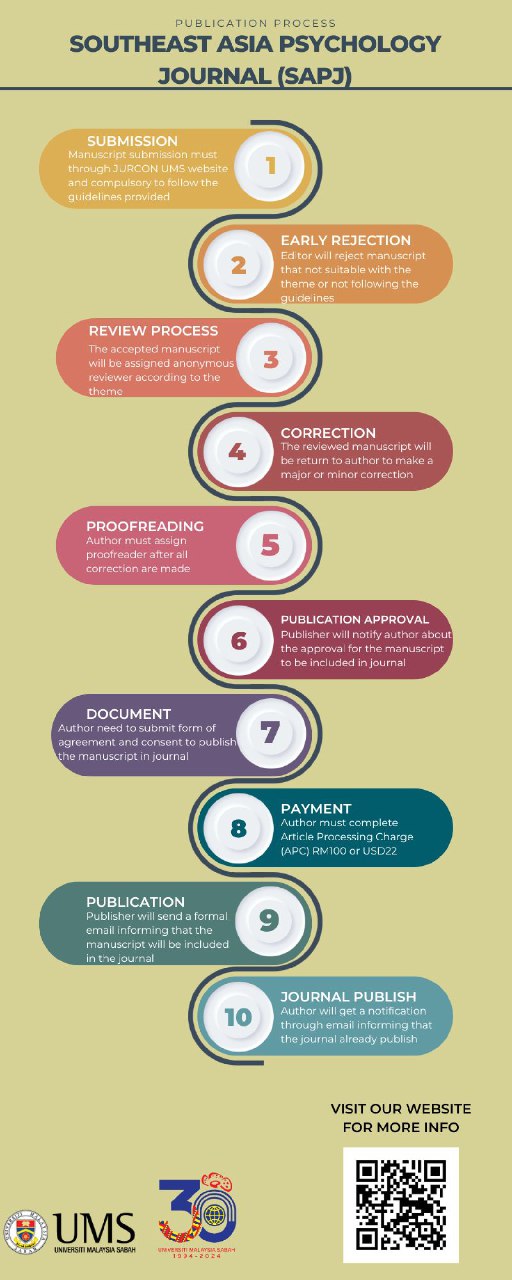The Relationship Between Parental Attachment Toward Delinquent Behavior among Young Offenders
DOI:
https://doi.org/10.51200/sapj.v3i1.5660Keywords:
Parental attachment, Delinquent behavior, Young offendersAbstract
This study examined the relationship between parental attachment and delinquent behavior and the differences between age ranged and delinquency types among young offenders in Sabah. A total of 92 young offenders aged 16-21 years old were selected by using purposive sampling method from rehabilitation institutions in Sabah. The revised version of Inventory of Parents and Peers Attachments (Revised-IPPA-R) and the Junger Delinquency Scale were used in this study. The correlation findings shows that there is a weak negative and significant relationship between parental attachment and delinquent behavior (r=-.337, k<0.05). Specifically, the higher the parental attachment, the lower the delinquent behavior. Discussion on the implications for young offenders, families and communities were discussed. Some suggestions on future research were also provided.
References
Baharom, B. (2006). Persekitaran keluarga dan kesannya terhadap tingkah laku devian remaja di Daerah Pontian, Johor (Tesis sarjana). Fakulti Pendidikan: Universiti Teknologi Malaysia.
Carter, K. E. (2009). The relationship between delinquent behaviour, adolescent parent relationships, and intergenerational cycles of crime. College of William & Mary Undergraduate Honors Theses. Paper 335. Retrieved from:http://publish.wm.edu/cgi/viewcontent.cgi?article=1344&context=honorsthees
Che Latiff, A., Rathakrishnan, B., Safri @ Jarimal & Suis @ Mohd Rusdy (2015). Hubungan antara perapatan ibu bapa, rakan sebaya dan Self-esteem dengan penglibatan remaja pelbagai etnik (Kadazan, Dusun, Bajau dan Murut) ke atas penyalahgunaan gam dan syabu di Kota Kinabalu, Sandakan dan Tawau. Unpublished RAGS research grant: Universiti Malaysia Sabah.
Gao, Y., Yu, Y., Ting. K. N. (2013). A study on the moderating effect of family functioning on the relationship between deviant peer affiliation and delinquency among Chinese adolescents. Advances in Applied Sociology, 3, 178-185.
Henggeler, W. S. (1989). Delinquency in adolescence. SAGE Publications, Inc. Newbury Park, California.
Hussin, N. (2007). Juvenile delinquency in Malaysia: Legal framework and prospects for reforms. Revised version of conference paper presented at The 4th World Congress on Family Law and Children’s Right, Cape Town, South Africa, 20-23 March 2005.
Hoeve, M., Dubas, S. J., Eichelsheim, I., V., Van Der Laan, H., P., Smenk, W., & Gerris, M., R., J. (2009). The relationship between parenting and delinquency: A meta-analysis. Journal of Abnormal Child Psychology, 37, 749-775
Ngale, F. I. (2009). Family structure and juvenile delinquency: Correctional centreBetamba, centre province of Cameroon. Internet Journal of Criminology. Retrieved from: http://www.internetjournalofcriminology.com/ngale_family_structure_and_jueniledelinquency.pdf
Kim, H., S., & Kim, H. S. (2005). Gender differences in delinquent behavior amongKorean Adolescents. Child Psychiatry and Human Development, 35, 325-345.
Kassim, A., W. (2016). Juveniles on remand: trends and practices in Malaysia. Retrieved from: http://www.unafei.or.jp/english/pdf/RS_No68/No68_17PA_Kassim.pdf
Parker, S., J., & Benson, J., M. (2004). Parent-adolescent relations and adolescentfunctioning: Self-esteem, substance abuse, and delinquency. ADOLESCENCE, 39, 155.
Sharma, A. (2012). Correlates of juvenile delinquency: The role of family environment and self-esteem. Advances in Asian Social Science (AASS), Vol. 4, No. 1.
Nasir, R., Ahmad, Z., Z., Khairudin, R., & Wan Sharazad, W. S. (2011). Familyfunctioning, self esteem, self-concept and cognitive distortion among juvenile delinquents. The Social Sciences 6(2): 155-163.








